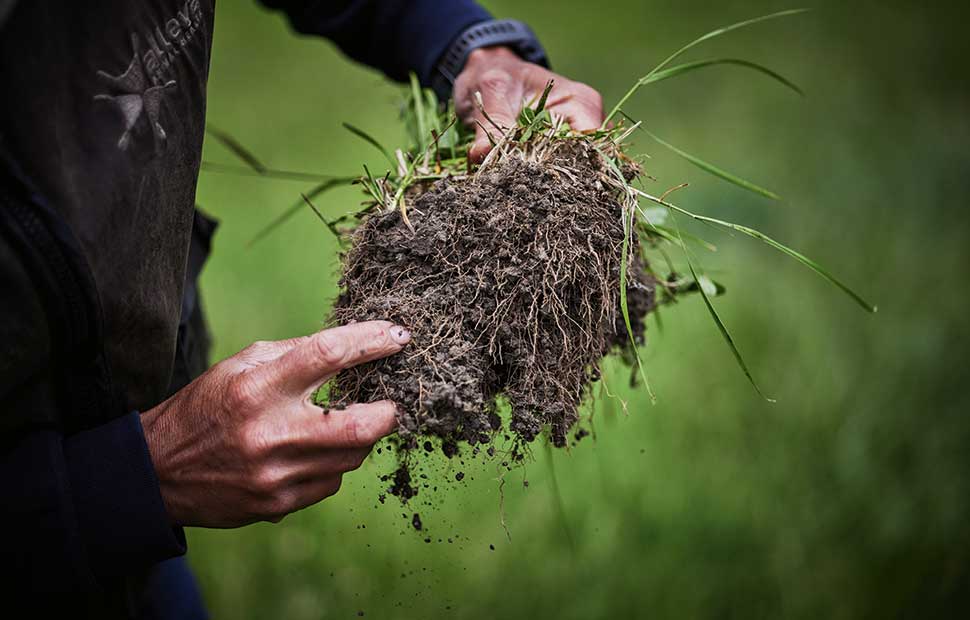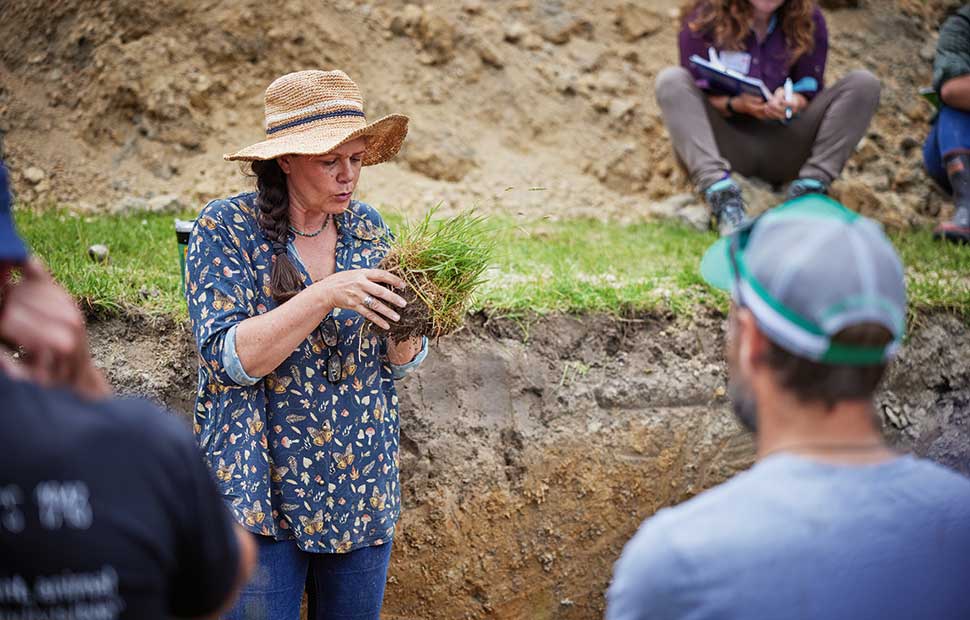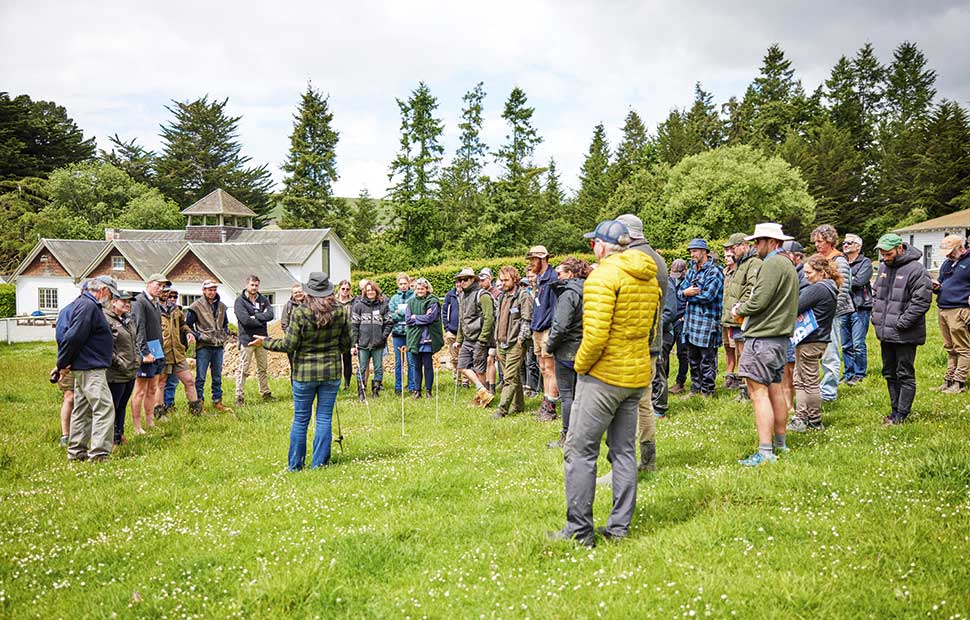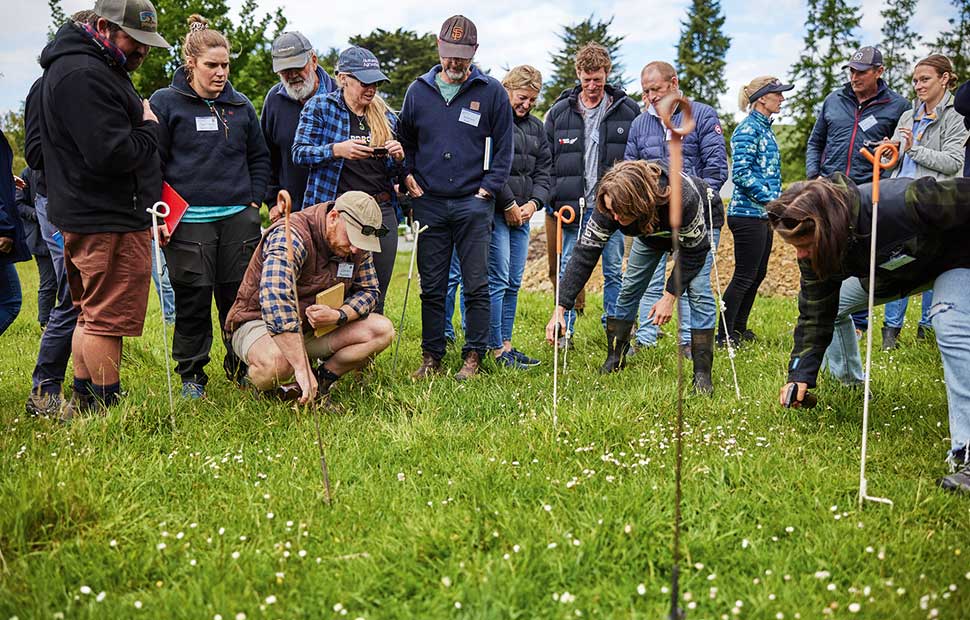The Downward Journey: For the love of soil

Angela Clifford reflects on her almost two-decade journey into soil health, and a a recent workshop with the woman who provided the tools to think differently.
Images: Camilla Rutherford
When my husband Nick and I started growing food on The Food Farm 16 years ago, we had a few years of bumper crops, dug from annually tilled soil which hadn’t been anything other than pasture for decades. In hindsight, it was the start we needed, as we’d just built a house, Ruby was a toddler and I was pregnant with Matilda. The abundance encouraged us to grow more and expand the size of our vegetable beds. However, after a few years, the bounty started to level out, and we noticed more and more crops with pests and diseases. By tilling the soil to germinate seeds, we had developed a substantial weed issue.
When my youngest, Flynn, arrived a couple of years later, our tired bodies and brains naturally gravitated towards easy solutions. Many people in those moments of overwhelm and time poverty would reach for the spray pack, and I am the last person on earth to judge any struggling parents short of time and energy. But what made a difference for us was permaculture.
We were taught to think about the bigger system and what might be causing the low yields, issues with pests and disease, and excess weeds. To spend time observing and understanding the interconnectedness of the natural world is one of the greatest gifts that permaculture has given me. It has influenced all parts of my life, from the farm, my work with Eat New Zealand, and my relationships. So it was that this contemplation changed the direction of The Food Farm significantly. It wasn’t that we implemented major changes, just a new mindset and some minor tweaks in our methods. Everything started to thrive. We were fortunate to have people in our life, like Michael Voumard – a biodynamic stalwart from North Canterbury. Even though we didn’t share his enthusiasm for biodynamics, we were open to the idea that perhaps we were part of a bigger system, and it was up to us to work with nature, rather than tame it, to achieve the best results. But it was the focus on the miniscule, the microbiology of life, that took us down the biggest wormhole of all – into the world of soil health. We didn’t have to travel very far before we discovered Nicole Masters.

Along with exploring technical soil assessments and analysis, Nicole’s workshops are designed to encourage participants to let go of convention and old believes to embrace novel ideas and approaches.
A New Zealand soil ecologist, Nicole wrote For the Love of Soil, a book that changed so much about how we saw our world. Reading it was like righting a picture that I’d been looking at upside down. My focus changed completely and I had a profound moment of clarity. It just makes sense. That’s not to say I started to understand everything, probably very little, but I
understood the basic principle which is that the health of our soil is intimately connected to the health of our plants, animals and ourselves. For instance, instead of fretting about the pests and diseases attacking my plants, I was able to ask why those pests and diseases were an issue in the first place. I began to understand that something was going on underneath the ground that was affecting the plants’ ability to ward off pests and diseases.
From that single moment of understanding that Nicole provided through her book, I had the opportunity to change how we grow food here. And so we stopped digging. We started mulching, making sure the soil was always covered. We increased the diversity of what we grew, planting multi-species pasture, interplanting vegetables, aiming to attract more pollinators, and growing food forests to support fungi in the soil. We started thinking about the role our animals and plants could play in improving soil health, rather than the other way around.

Taking place at Craigmore Station near Timaru, Nicole’s South Island workshop was a “mindhive” of farmers, growers, regenerators and soil geeks, all united in their shared interest of the world beneath their feet
Until I read For the Love of Soil, I thought that soil grows plants. In reality, it’s the plants that grow soil. The act of photosynthesis captures sunlight and turns it into food which feeds all the microbiology in the soil. There’s a lot of it to feed. There are more microorganisms in a teaspoon of soil than there are people on the planet, and we have very limited understanding of most of them.
It’s a Horton Hears A Who moment – the discovery of a whole world on the head of a pin! Food is my life, and to have gone so long without realising the complexity of the system that creates it was a profoundly humbling moment.
Meeting the master
Nicole Masters doesn’t live in New Zealand. She lives in Montana, where she conducts extremely popular workshops and consultations aimed at farmers and growers who want to improve the way they operate. Through her speaking and training, she’s earned a reputation as an extremely influential and eloquent expert, capable of converting even the hardest, staunchest, and most traditional American ranchers into advocates for regenerative agriculture. Late last year, I learned that she was coming to New Zealand to host two workshops. Needing to hear from – and hug – the woman who had opened this whole new world to me, me and Nick signed up to her Canterbury workshop without hesitation.
While I was keen to further my knowledge of soil health, I was just as interested to observe Nicole’s ability to shift minds as much as her ability to change physical landscapes.
The morning of the workshop, we arrived at Craigmore Station near Timaru, and I was immediately struck by the collective passion on the paddock. Big farmers, small farmers, growers, scientists, students – the group was a palpable mind hive of understanding and interest in the soil health space. Everyone was there for a reason, everyone was there to learn. With so many learned people on the paddock – many of whom knew far more than me – I took on a position of “I know nothing” and divested myself of any need to feel like an expert in the space. It turned out to be a wise strategy, as much of Nicole’s teaching involves encouraging people to let go of their tightly held beliefs and open their minds to something new.
She emphasised that learning happens out of your comfort zone, not in it. We live in a space of naturally wanting and seeking safety, and we oftenn think that the best way to do something is to do what we’ve always done. But the essence of that workshop was about stepping out of the safe space and exploring new ideas.

Nicole believes that breakthroughs in regenerative farming practice won’t come from clinical research or technological envelopment, but from the farmers and growers who are willing to take a risk and a apply a “whole systems” approach that works with nature, rather than against it.
That weekend I added a new quote by Voltaire to my list of favourites. “Doubt is not a pleasant condition, but certainty is an absurd one”.
It was very humbling to know that I was surrounded by people, farmers and growers, who were stepping outside their comfort zones to make decisions to create better outcomes, at the risk of fundamentally affecting their livelihoods. They were letting go of the side of the swimming pool and learning to swim.
Throughout the workshop, Nicole naturally delved into the complexities of soil microbiology and the methods we can employ to enhance it (see sidebar). Acknowledging how little I knew about the subject allowed me to absorb this new information freely and willingly, without it clashing with entrenched beliefs. The term “regenerative” applies just as much to mindset as it does to agriculture. I interpret the term as a call to continually keep my mind open and to create the space to learn. There is so much at stake when you’re farming that it’s easy to revert to how things have always been done. But as author Eliot Schrefer once wrote: “Traditions are just peer pressure from dead people” And so, after a couple of days with Nicole Masters, my brain felt clean and fresh, the old info replaced with the new.
Legendary arable farmer Simon Osborne was there at the workshop, and he summed it up well when he said, “I s tarted thinking I knew everything about soil, only to have the doors in the back of my head blasted open and the fresh air came streaming in”.
Enter to win one of three copies of Nicole Masters’ For the Love of Soil, here.
Love this story? Subscribe now!
 This article first appeared in NZ Lifestyle Block Magazine.
This article first appeared in NZ Lifestyle Block Magazine.
